The Service Engine
In this chapter, we will be exploring the Service Engine. Services in OFBiz
operate in a Service Oriented
Architecture (SOA). These services not only have the ability to
invoke other services internaBlly, but can also be 'opened up' and invoked by
remote applications using, amongst other methods, the widely adopted messaging
protocol SOAP.
Besides serving as a platform for interoperability, OFBiz services also offer us
additional capability to organize our code. The traditional organizational
strategies in object-oriented
Java were a great improvement over the procedural paradigm.
|
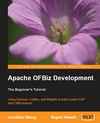
This chapter excerpt from
Apache OFBiz Development: The Beginner's Tutorial by Rupert
Howell and Jonathon Wong , is printed with permission from
Packt Publishing, Copyright 2007.
|
Wrapping both methods and variables together into objects to form a powerful
"behavioral model" for code organization (where object's methods and variables
defi ne their behavior). Similarly with OFBiz services we are able to bundle
groups of behavior together to form a coherent "service". We can say that OFBiz
services, in terms of code or software organization, operate at a higher level
than Java objectoriented
organizational strategies.
In this chapter, we will be looking at:
Defining a Service
We first need to defi ne a service. Our fi rst service will be named
learningFirstService.
In the folder ${component:learning}, create a new folder called servicedef. In
that folder, create a new file called services.xml and enter into it this:
<?xml version="1.0" encoding="UTF-8" ?>
<services xmlns:xsi= "http://www.w3.org/2001/XMLSchema-instance"
xsi:noNamespaceSchemaLocation= "http://www.ofbiz.org/dtds/services.xsd">
<description>Learning Component
Services</description>
<service name="learningFirstService"
engine="java" location="org.ofbiz.learning.learning.LearningServices"
invoke="learningFirstService">
<description>Our First
Service</description>
<attribute name="firstName" type="String" mode="IN"
optional="true"/>
<attribute name="lastName" type="String" mode="IN"
optional="true"/>
</service>
</services>
In the file ${component:learning}\ofbiz-component.xml, add after the last
<entity-resource> element this:
<service-resource type="model" loader="main"
location="servicedef/services.xml"/>
That tells our component learning to look for service defi nitions in the fi le
${component:learning}\servicedef\services.xml.
Creating the Java Code for the Service
In the package org.ofbiz.learning.learning, create a new class called
LearningServices with one static method learningFirstService:
package org.ofbiz.learning.learning;
import java.util.Map;
import org.ofbiz.service.DispatchContext;
import org.ofbiz.service.ServiceUtil;
public class LearningServices
{
public static final String module =
LearningServices.class.getName();
public static Map
learningFirstService(DispatchContext dctx, Map context)
{
Map resultMap =
ServiceUtil.returnSuccess("You have called on service 'learningFirstService'
successfully!");
return resultMap;
}
}
Services must return a map. This map must contain at least one entry. This entry
must have the key responseMessage (see org.ofbiz.service.ModelService.
RESPONSE_MESSAGE), having a value of one of the following:
-
success or ModelService.RESPOND_SUCCESS
-
error or ModelService.RESPOND_ERROR
-
fail or ModelService.RESPOND_FAIL
By using ServiceUtil.returnSuccess() to construct the minimal return map, we do
not need to bother adding the responseMessage key and value pair.
Another entry that is often used is that with the key successMessage
(ModelService.SUCCESS_MESSAGE). By doing ServiceUtil.returnSuccess("Some
message"), we will get a return map with entry successMessage of value "Some
message". Again, ServiceUtil insulates us from having to learn the convention
in key names.
Testing Our First Service
Stop OFBiz, recompile our learning component and restart OFBiz so that the
modifi ed ofbiz-component.xml and the new services.xml can be loaded.
In ${component:learning}\widget\learning\LearningScreens.xml, insert a new
Screen Widget:
<screen name="TestFirstService">
<section>
<widgets>
<section>
<condition><if-empty field-name="formTarget"/></condition>
<actions>
<set field="formTarget" value="TestFirstService"/>
<set field="title" value="Testing Our First Service"/>
</actions>
<widgets/>
</section>
<decorator-screen name="main-decorator"
location="${parameters.mainDecoratorLocation}">
<decorator-section name="body">
<include-form name="TestingServices"
location="component://learning/widget/learning/
LearningForms.xml"/>
<label text="Full Name: ${parameters.fullName}"/>
</decorator-section>
</decorator-screen>
</widgets>
</section>
</screen>
In the fi le ${component:learning}\widget\learning\LearningForms.xml, insert a
new Form Widget:
<form name="TestingServices" type="single" target="${formTarget}">
<field
name="firstName"><text/></field>
<field
name="lastName"><text/></field>
<field
name="planetId"><text/></field>
<field
name="submit"><submit/></field>
</form>
Notice how the formTarget fi eld is being set in the screen and used in the
form. For now don't worry about the Full Name label we are setting from the
screen. Our service will eventually set that.
In the fi le ${webapp:learning}\WEB-INF\controller.xml, insert a new request
map:
<request-map uri="TestFirstService">
<event type="service" invoke="learningFirstService"/>
<response name="success" type="view" value="TestFirstService"/>
</request-map>
The control servlet currently has no way of knowing how to handle an event of
type service, so in controller.xml we must add a new handler element
immediately under the other <handler> elements:
<handler name="service" type="request"
class="org.ofbiz.webapp.event.ServiceEventHandler"/>
<handler name="service-multi" type="request"
class="org.ofbiz.webapp.event.ServiceMultiEventHandler"/>
We will cover service-multi services later. Finally add a new view map:
<view-map name="TestFirstService" type="screen"
page="component://learning/widget/learning/
LearningScreens.xml#TestFirstService"/>
Fire to webapp learning an http OFBiz request TestFirstService, and see that we
have successfully invoked our fi rst service:
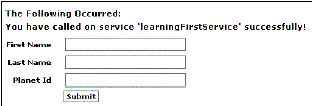
Service Parameters
J ust like Java methods, OFBiz services can have input and output parameters and
just like Java methods, the parameter types must be declared.
Input Parameters (IN)
Our first service is defi ned with two parameters:
<attribute name="firstName" type="String" mode="IN" optional="true"/>
<attribute name="lastName" type="String" mode="IN" optional="true"/>
Any parameters sent to the service by the end-user as form parameters, but not
in the services list of declared input parameters, will be dropped. Other
parameters are converted to a Map by the framework and passed into our static
method as the second parameter.
Add a new method handleInputParamaters to our LearningServices class.
public static Map handleParameters(DispatchContext dctx, Map context)
{
String firstName = (String)context.get("firstName");
String lastName = (String)context.get("lastName");
String planetId= (String)context.get("planetId");
String message = "firstName: " + firstName + "<br/>";
message = message + "lastName: " + lastName + "<br/>";
message = message + "planetId: " + planetId;
Map resultMap = ServiceUtil.returnSuccess(message);
return resultMap;
}
We can now make our service defi nition invoke this method instead of the
learningFirstService method by opening our services.xml fi le and replacing:
<service name="learningFirstService" engine="java"
location="org.ofbiz.learning.learning.LearningServices"
invoke="learningFirstService">
with:
<service name="learningFirstService" engine="java"
location="org.ofbiz.learning.learning.LearningServices"
invoke="handleParameters">
Once again shutdown, recompile, and restart OFBiz.
Enter for fields First Name, Last Name, and Planet Id values Some, Name, and
Earth, respectively. Submit and notice that only the fi rst two parameters went
through to the service. Parameter planetId was dropped silently as it was not
declared in the service definition.
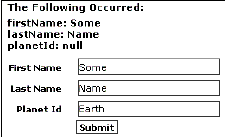
Modify the service learningFirstService in the fi le ${component:learning}\
servicedef\services.xml, and add below the second parameter a third one like
this:
<attribute name="planetId" type="String" mode="IN" optional="true"/>
Restart OFBiz and submit the same values for the three form fi elds, and see all
three parameters go through to the service.
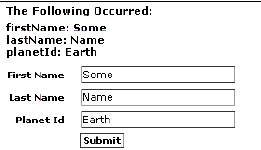
Output Parameters (OUT)
Jus t like Java methods have return values (although Java methods can have only
one typed return value), services can be declared with output parameters. When
invoked as events from the controller, parameters will be silently dropped if
they are not declared in our service's defi nition. Add this to our service
defi nition:
<attribute name="fullName" type="String" mode="OUT" optional="true"/>
And in the method handleParameters in org.ofbiz.learning.learning.
LearningServices replace:
Map resultMap = ServiceUtil.returnSuccess(message);
return resultMap;
with
Map resultMap = ServiceUtil.returnSuccess(message);
resultMap.put("fullName", firstName + " " + lastName);
return resultMap;
We have now added the fullName parameter to the resultMap. To see this in action
we need to create a new screen widget in LearningScreens.xml:
<screen name="TestFirstServiceOutput">
<section>
<actions><set field="formTarget"
value="TestFirstServiceOutput"/></actions>
<widgets>
<include-screen name="TestFirstService"/>
</widgets>
</section>
</screen>
Add the request-map to the controller.xml file:
<request-map uri="TestFirstServiceOutput">
<event type="service" invoke="learningFirstService"/>
<response name="success" type="view" value="TestFirstServiceOutput"/>
</request-map>
and fi nally the view-map:
<view-map name="TestFirstServiceOutput" type="screen"
page="component://learning/widget/learning/
LearningScreens.xml#TestFirstServiceOutput"/>
Stop OFBiz, rebuild our Learning Component and restart, fi re an OFBiz http
request TestFirstServiceOutput to webapp learning. Submit your first and last
names and planet and notice that now the fullName parameter has been populated.
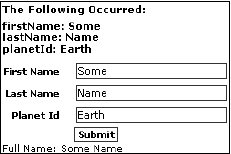
Two Way Parameters (INOUT)
A service may change the value of an input parameter and we may need a calling
service to be aware of this change. To save us declaring the same parameter
twice, with a mode for IN and a mode for OUT, we may use the mode INOUT.
<attribute name="fullName" type="String" mode="INOUT" optional="true"/>
Special Unchecked Parameters
Ther e are a few special cases where IN/OUT parameters can exist even though the
service defi nition does not declare them. They are:
-
responseMessage
-
errorMessage
-
errorMessageList
-
successMessage
-
successMessageList
-
userLogin
-
locale
The parameters responseMessage, errorMessage, errorMessageList, successMessage
and successMessageList are necessary placeholders for feedback messages. They
must be allowed through all validation checks.
The parameter userLogin is often required for authentication and permissions
checks.
The parameter locale is needed just about everywhere in OFBiz. For localespecifi
city in certain operations like retrieving template feedback messages, or like
formatting numbers and currency fi gures.
Optional and Compulsory Parameters
The Service Engine checks the validity of the input and the output to ensure
that what is coming into the service and is leaving adheres to the service defi
nition. If the optional attribute is set to false and an expected parameter is
missing, then the validation will fail and the service will return an error.
This transaction will now be marked for rollback, meaning any changes to the
database made during this transaction will never be committed. This could
include any changes made to the database by calling services. For example:
<attribute name="fullName" type="String" mode="INOUT" optional="false"/>
Here the parameter fullName must be passed into the service and the service must
also add this parameter to the resultMap and pass it out or validation will
fail and an error will be thrown.
Try changing all of the optional flags on our newly created service to false.
After a restart we should see:
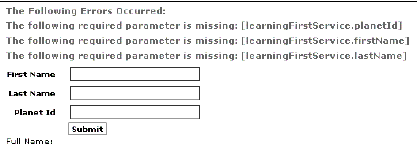
The DispatchContext
We ha ve already seen how parameters are passed into our Java method as a Map.
Just as the userLogin object of type GenericValue and the locale object of type
Locale were added as attributes to the request for the Java events, both are
now automatically added to this context map when the service is invoked in this
way.
The first parameter, the DispatchContext, contains the remaining tools we need
to access the database, or to invoke other services.
From our Java code we can get access to the following handy objects like this:
GenericValue userLogin = (GenericValue)context.get("userLogin");
Locale locale = (Locale)context.get("locale");
GenericDelegator delegator = dctx.getDelegator();
LocalDispatcher dispatcher = dctx.getDelegator();
Security security = dctx.getSecurity();
For a full list of objects that are available from the DispatchContext, take a
look through the code in org.ofbiz.service.DispatchContext.
The service engine is in no way reliant on there being HTTPServletRequest or
HTTPServletResponse objects available. Because of this we are able to invoke
services outside of the web environment and they can be invoked remotely or
scheduled to run "offline".
Service Security and Access Control
Security-related programming in services is exactly like that in events.
In the class org.ofbiz.learning.learning.LearningServices, create a new static
method serviceWithAuth:
public static Map serviceWithAuth(DispatchContext dctx, Map context){
Security security = dctx.getSecurity();
Map resultMap = null;
if (context.get("userLogin") == null ||
!security.hasPermission("LEARN_VIEW",
(GenericValue)context.get("userLogin"))) {
resultMap = ServiceUtil.returnError("You have no
access
here. You're not
welcome!");
}
else {
resultMap = ServiceUtil.returnSuccess("Welcome! You have access!");
}
return resultMap;
}
Ensure that the correct imports have been added to the class:
import java.util.Map;
import org.ofbiz.entity.GenericValue;
import org.ofbiz.security.Security;
In the file ${component:learning}\servicedef\services.xml, add a new service
definition:
<service name="learningServiceWithAuth" engine="java"
location="org.ofbiz.learning.learning.LearningServices"
invoke="serviceWithAuth">
<description>Service with some security-related codes
</description>
</service>
In the file ${webapp:learning}\WEB-INF\controller.xml, add a new request map:
<request-map uri="TestServiceWithAuth">
<security auth="true" https="true"/>
<event type="service" invoke="learningServiceWithAuth"/>
<response name="success" type="view" value="SimplestScreen"/>
<response name="error" type="view" value="login"/>
</request-map>
Rebuild and restart and then fi re to webapp learning an http OFBiz request
TestServiceWithAuth, login with username allowed password ofbiz, and see the
welcome message displayed:
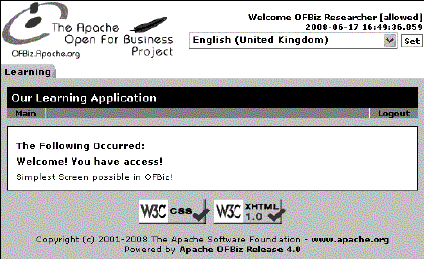
Logging in with username denied password zibfo will show an error message.
Thanks to the request-map's response element named error having a value of
login, we are returned back to the login screen:
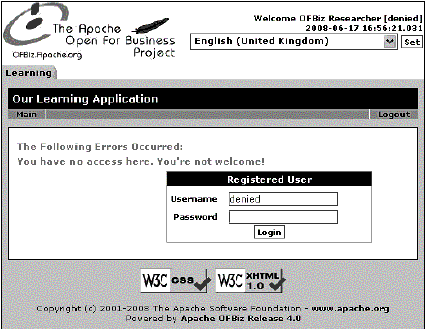
Calling Services from Java Code
So far, we have explored services invoked as events from the controller (example
<event type="service" invoke="learningFirstService"/>). We now look at
calling services explicitly from code.
To invoke services from code, we use the dispatcher object, which is an object
of type org.ofbiz.service.ServiceDispatcher. Since this is obtainable from the
DispatchContext we can invoke services from other services.
To demonstrate this we are going to create one simple service that calls
another.
In our services.xml fi le in ${component:learning}\servicedef add two new
service defi nitions:
<service name="learningCallingServiceOne" engine="java"
location="org.ofbiz.learning.learning.LearningServices"
invoke="callingServiceOne">
<description>First Service Called From The Controller
</description>
<attribute name="firstName" type="String" mode="IN" optional="false"/>
<attribute name="lastName" type="String" mode="IN" optional="false"/>
<attribute name="planetId" type="String" mode="IN" optional="false"/>
<attribute name="fullName" type="String" mode="OUT" optional="true"/>
</service>
<service name="learningCallingServiceTwo" engine="java"
location="org.ofbiz.learning.learning.LearningServices"
invoke="callingServiceTwo">
<description>Second Service Called From Service One</description>
<attribute name="planetId" type="String" mode="IN" optional="false"/>
</service>
In this simple example it is going to be the job of learningCallingServiceOne to
prepare the parameter map and pass in the planetId parameter to
learningCallingServiceTwo. The second service will determine if the input is
EARTH, and return an error if not.
In the class org.ofbiz.learning.learning.LearningEvents, add the static method
that is invoked by learningCallingServiceOne:
public static Map callingServiceOne(DispatchContext dctx, Map context)
{
LocalDispatcher dispatcher = dctx.getDispatcher();
Map resultMap = null;
String firstName = (String)context.get("firstName");
String lastName = (String)context.get("lastName");
String planetId = (String)context.get("planetId");
GenericValue userLogin =
(GenericValue)context.get("userLogin");
Locale locale = (Locale)context.get("locale");
Map serviceTwoCtx = UtilMisc.toMap("planetId", planetId,
"userLogin", userLogin, "locale", locale);
try{
resultMap =
dispatcher.runSync("learningCallingServiceTwo", serviceTwoCtx);
}catch(GenericServiceException e){
Debug.logError(e, module);
}
resultMap.put("fullName", firstName + " " + lastName);
return resultMap;
}
and also the method invoked by learningServiceTwo:
public static Map callingServiceTwo(DispatchContext dctx, Map
context){
String planetId = (String)context.get("planetId");
Map resultMap = null;
if(planetId.equals("EARTH")){
resultMap = ServiceUtil.returnSuccess("This planet is
Earth");
}else{
resultMap = ServiceUtil.returnError("This planet is NOT
Earth");
}
return resultMap;
}
To LearningScreens.xmladd:
<screen name="TestCallingServices">
<section>
<actions><set field="formTarget"
value="TestCallingServices"/></ actions>
<widgets>
<include-screen
name="TestFirstService"/>
</widgets>
</section>
</screen>
Finally add the request-map to the controller.xml file:
<request-map uri="TestCallingServices">
<security auth="false" https="false"/>
<event type="service" invoke="learningCallingServiceOne"/>
<response name="success" type="view" value="TestCallingServices"/>
<response name="error" type="view" value="TestCallingServices"/>
</request-map>
and also the view-map:
<view-map name="TestCallingServices" type="screen"
page="component://learning/widget/learning/
LearningScreens.xml#TestCallingServices"/>
Stop, rebuild, and restart, then fi re an OFBiz http request TestCallingServices
to webapp learning. Do not be alarmed if straight away you see error messages
informing us that the required parameters are missing. By sending this request
we have effectively called our service with none of our compulsory parameters
present.
Enter your name and in the Planet Id, enter EARTH. You should see:

Try entering MARS as the Planet Id.
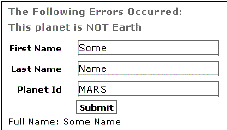
Notice how in the Java code for the static method callingServiceOne the line
resultMap = dispatcher.runSync("learningCallingServiceTwo", serviceTwoCtx);
is wrapped in a try/catch block. Similar to how the methods on the
GenericDelegator object that accessed the database threw a
GenericEntityException, methods on our dispatcher object throw a
GenericServiceException which must be handled.
There are three main ways of invoking a service:
-
runSync—which runs a service synchronously and returns the result as a map.
-
runSyncIgnore—which runs a service synchronously and ignores the result.
Nothing is passed back.
-
runAsync—which runs a service asynchronously. Again, nothing is passed back.
The difference between synchronously and asynchronously run services is
discussed in more detail in the section called Synchronous and Asynchronous
Services.
Implementing Interfaces
Open up the services.xml fi le in ${component:learning}\servicedef and take a
look at the service defi nitions for both learningFirstService and
learningCallingServiceOne.
Do you notice that the <attribute> elements (parameters) are the same? To
cut down on the duplication of XML code, services with similar parameters can
implement an interface.
As the first service element in this fi le enter the following:
<service name="learningInterface" engine="interface">
<description>Interface to describe base parameters for Learning
Services</description>
<attribute name="firstName" type="String" mode="IN" optional="false"/>
<attribute name="lastName" type="String" mode="IN" optional="false"/>
<attribute name="planetId" type="String" mode="IN" optional="false"/>
<attribute name="fullName" type="String" mode="OUT" optional="true"/>
</service>
Notice that the engine attribute is set to interface.
Replace all of the <attribute> elements in the learningFirstService and
learningCallingServiceOne service definitions with:
<implements service="learningInterface"/>
So the service defi nition for learningServiceOne becomes:
<service name="learningCallingServiceOne" engine="java"
location="org.ofbiz.learning.learning.LearningServices"
invoke="callingServiceOne">
<description>First Service Called From The Controller
</description>
<implements service="learningInterface"/>
</service>
Restart OFBiz and then fi re an OFBiz http request TestCallingServices to webapp
learning. Nothing should have changed—the services should run exactly as
before, however our code is now somewhat tidier.
Overriding Implemented Attributes
It may be the case that the interface specifi es an attribute as
optional="false", however, our service does not need this parameter. We can
simply override the interface and add the
element with whatever settings we wish.
For example, if we wish to make the planetId optional in the above example, the
<implements> element could remain, but a new
element would be added like this:
<service name="learningCallingServiceOne" engine="java"
location="org.ofbiz.learning.learning.LearningServices"
invoke="callingServiceOne">
<description>First Service Called From The Controller
</description>
<implements service="learningInterface"/>
<attribute name="planetId" type="String" mode="IN" optional="false"/>
</service>
Synchronous and Asynchronous Services
Th e service engine allows us to invoke services synchronously or
asynchronously. A synchronous service will be invoked in the same thread, and
the thread will "wait" for the invoked service to complete before continuing.
The calling service can obtain information from the synchronously run service,
meaning its OUT parameters are accessible.
Asynchronous services run in a separate thread and the current thread will
continue without waiting. The invoked service will effectively start to run in
parallel to the service or event from which it was called. The current thread
can therefore gain no information from a service that is run asynchronously. An
error that occurs in an asynchronous service will not cause a failure or error
in the service or event from which it is called.
A good example of an asynchronously called service is the sendOrderConfirmation
service that creates and sends an order confi rmation email. Once a customer
has placed an order, there is no need to wait while the mail service is called
and the mail sent. The mail server may be down, or busy, which may result in an
error that would otherwise stop our customer form placing the order. It is much
more preferable to allow the customer to continue to the Order Confi rmation
page and have our business receive the valuable order. By calling this service
asynchronously, there is no delay to the customer in the checkout process, and
while we log and fi x any errors with the mail server, we still take the order.
Behind the scenes, an asynchronous service is actually added to the Job
Scheduler. It is the Job Scheduler's task to invoke services that are waiting
in the queue.
Using the Job Scheduler
Asynchronous services are added to the Job Scheduler automatically. However, we
can see which services are waiting to run and which have already been invoked
through the Webtools console. We can even schedule services to run once only or
recur as often as we like.
Open up the Webtools console at https://localhost:8443/webtools/control/ main
and take a look under the Service Engine Tools heading. Select Job List to view
a full list of jobs. Jobs without a Start Date/Time have not started yet. Those
with an End Date/Time have completed. The Run Time is the time they are
scheduled to run. All of the outstanding jobs in this list were added to the
JobSandbox Entity when the initial seed data load was performed, along with the
RecurrenceRule (also an Entity) information specifying how often they should be
run. They are all maintenance jobs that are performed "offl ine".
The Pool these jobs are run from by default is set to pool. In an architecture
where there may be multiple OFBiz instances connecting to the same database,
this can be important. One OFBiz instance can be dedicated to performing
certain jobs, and even though job schedulers may be running on each instance,
this setting can be changed so we know only one of our instances will run this
job.
Th e Service Engine settings can be confi gured in framework\service\config\
serviceengine.xml. By changing both the send-to-pool attribute and the name
attribute on the
element, we can ensure that only jobs created on an OFBiz
instance are run by this OFBiz instance.
Cl ick on the Schedule Job button and in the Service fi eld enter
learningCallingServiceOne, leave the Pool as pool and enter today's date/time
by selecting the calendar icon and clicking on today's date. We will need to
add 5 minutes onto this once it appears in the box. In the below example the
Date appeared as 2008-06-18 14:11:24.265. This job is only going to be
scheduled to run once, although we could specify any recurrence information we
wish.
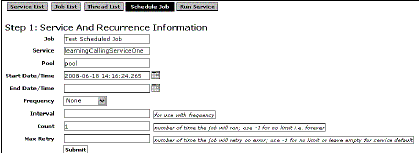
Select Submit and notice that scheduler is already aware of the parameters that
can (or must, in this case) be entered. This information has been taken from
the service defi nition in our services.xml fi le.
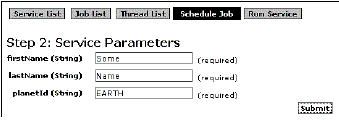
Press Submit to schedule the job and fi nd the entry in the list. This list is
ordered by Run Time so it may not be the fi rst. Recurring maintenance jobs are
imported in the seed data and are scheduled to run overnight. These will more
than likely be above the job we have just scheduled since their run-time is
further in the future. The entered parameters are converted to a map and then
serialized to the database. They are then fed to the service at run time.

Using the Webtools console it is also possible to run a service synchronously.
This is quicker than going through the scheduler should you need to test a
service or debug through a service. Select the Run Service button from the menu
and enter the same service name, submit then enter the same parameters again.
This time the service is run straight away and the OUT parameters and messages
are passed back to the screen:

Naming a Service and the Service Reference
Servic e names must be unique throughout the entire application. Because we do
not need to specify a location when we invoke a service, if service names were
duplicated we can not guarantee that the service we want to invoke is the one
that is actually invoked. OFBiz comes complete with a full service reference,
which is in fact a dictionary of services that we can use to check if a service
exists with the name we are about to choose, or even if there is a service
already written that we are about to duplicate.
From https://localhost:8443/webtools/control/main select the Service Reference
and select "l" for learning. Here we can see all of our learning services, what
engine they use and what method they invoke. By selecting the service
learningCallingServiceOne, we can obtain complete information about this
service as was defi ned in the service defi nition fi le services.xml. It even
includes information about the parameters that are passed in and out
automatically.
Careful selection of intuitive service names and use of the description tags in
the service defi nition fi les are good practice since this allows other
developers to reuse services that already exists, rather than duplicate work
unnecessarily.
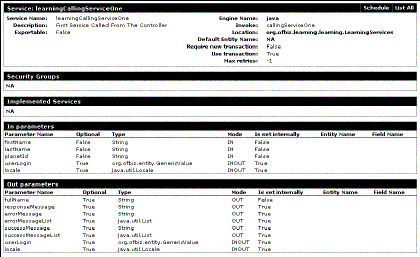
Event Condition Actions (ECA)
ECA ref ers to the structure of rules of a process. The Event is the trigger or
the reason why the rule is being invoked. The condition is a check to see if we
should continue and invoke the action, and the action is the fi nal resulting
change or modifi cation. A real life example of an ECA could be "If you are
leaving the house, check to see if it is raining. If so, fetch an umbrella". In
this case the event is "leaving the house". The condition is "if it is raining"
and the action is "fetch an umbrella".
There a re two types of ECA rules in OFBiz: Service Event Condition Actions
(SECAs) and Entity Event Condition Actions (EECAs).
Service Event Condition Actions (SECAs)
For SEC As the trigger (Event) is a service being invoked. A condition could be
if a parameter equalled something (conditions are optional), and the action is
to invoke another service.
SECAs are defi ned in the same directory as service defi nitions (servicedef).
Inside fi les named secas.xml
Take a look at the existing SECAs in applications\order\servicedef\secas.xml and
we can see a simple ECA:
<eca service="changeOrderStatus" event="commit" run-on-error="false">
<condition field-name="statusId" operator="equals"
value="ORDER_CANCELLED"/>
<action service="releaseOrderPayments" mode="sync"/>
</eca>
When the changeOrderStatus transaction is just about to be committed, a lookup
is performed by the framework to see if there are any ECAs for this event. If
there are, and the parameter statusId is ORDER_CANCELLED then the
releaseOrderPayments service is run synchronously.
Most commonly, SECAs are triggered on commit or return; however, it is possible
for the event to be in any of the following stages in the service's lifecycle:
-
auth—Before Authentication
-
in-validate—Before IN parameter validation
-
out-validate—Before OUT parameter validation
-
invoke—Before service invocation
-
commit—Just before the transaction is committed
-
return—Before the service returns
-
global-commit
-
global-rollback
The variables global-commit and global-rollback are a little bit different. If
the service is part of a transaction, they will only run after a rollback or
between the two phases (JTA implementation) of a commit.
There a re also two specifi c attributes whose values are false by default:
-
run-on-failure
-
run-on-error
You can set them to true if you want the SECA to run in spite of a failure or
error. A failure is the same thing as an error, except it doesn't represent a
case where a rollback is required.
It should be noted that parameters passed into the trigger service are
available, if need be, to the action service. The trigger services OUT
parameters are also available to the action service.
Before using SECAs in a component, the component must be informed of the
location of the ECA service-resources:
<service-resource type="eca" loader="main"
location="servicedef/secas.xml"/>
This line must be added under the existing<service-resource> elements in
the component's ofbiz-component.xml fi le.
Entity Event Condition Actions (EECAs)
For EEC As, the event is an operation on an entity and the action is a service
being invoked.
EECAs are defi ned in the same directory as entity defi nitions (entitydef):
inside fi les named eecas.xml.
They are used when it may not necessarily be a service that has initiated an
operation on the entity, or you may wish that no matter what service operates
on this entity, a certain course of action to be taken.
Open the eecas.xml fi le in the applications\product\entitydef directory and
take a look at the fi rst
element:
<eca entity="Product" operation="create-store" event="return">
<condition field-name="autoCreateKeywords" operator="not-equals"
value="N"/>
<action service="indexProductKeywords" mode="sync"
value-attr="productInstance"/>
</eca>
This ECA ensures that once any creation or update operation on a Product record
has been committed, so long as the autoCreateKeywords fi eld of this record is
not N, then the indexProductKeywords service will be automatically invoked
synchronously.
The operation can be any of the following self-explanatory operations:
-
create
-
store
-
remove
-
find
-
create-store (create or store/update)
-
create-remove
-
store-remove
-
create-store-remove
-
any
The return event is by far the most commonly used event in an EECA. But there
are also validate, run, cache-check,cache-put, and cache-clear events. There is
also the run-on-error attribute.
Before using EECAs in a component, the component must be informed of the
location of the eca entity-resource:
<entity-resource type="eca" loader="main" location="entitydef/eecas.xml"/>
must be added under the existing <entity-resource> elements in the
component's ofbiz-component.xml file.
Summary
This brings us to the end of our investigation into the OFBiz Service Engine. We
have discovered how useful the Service Oriented Architecture in OFBiz can be
and we have learnt how the use of some of the built in Service Engine tools,
like the Service Reference, can help us when we are creating new services.
|